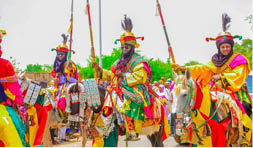Daura, Katsina hold Sallah durbar
As Muslims continue to celebrate this year’s Eid-el-Adha for the second day, the Emir of Katsina, Dr Abdulmumini Kabir Usman, has led hundreds of his subjects on a durbar to the old Government House in Katsina, the traditional Hawan Bariki. The emirate could not perform durbar on Sallah day on Sunday as torrential rain forced […]

dubar
As Muslims continue to celebrate this year’s Eid-el-Adha for the second day, the Emir of Katsina, Dr Abdulmumini Kabir Usman, has led hundreds of his subjects on a durbar to the old Government House in Katsina, the traditional Hawan Bariki.
The emirate could not perform durbar on Sallah day on Sunday as torrential rain forced Muslims to say the two units of Eid-el-Akbar prayer in mosques rather than the usual eid grounds.
Meanwhile, in Daura, the emir, Dr Umar Farouq Umar, former President Muhammadu Buhari and other Muslim faithful performed the eid prayers.
After the eid prayer, the emir proceeded to the Kangiwa courtyard of the emir’s palace to receive homage from his district heads and their contingents.
- Sacrifice: Lead by example, Nigerians reply Tinubu
- Only 10% have normal vision in Kano, Jigawa – Expert
Drummers, singers, hunters and archers, amongst others, added colour to the occasion by displaying their rich cultural heritage.
According to tradition in Katsina, the second day of Sallah, the emir pays visit to the governor at the old Government House.
This tradition dates back to the time of the colonial rule, and the durbar is referred to as Hawan Bariki, while in Daura, the durbar on the second Sallah day is referred to as Hawan Magajia (refering to Magajiya Daurama (the Queen of Daura).
In Katsina, during the durbar, each district head and traditional titleholder, led their contingent of horse-riders, adorned in traditional royal and war attires, accompanied by their drummers and flute blowers, singers and dancers.
In his message, the emir called for unity amongst the people of the state and urged them to be their brothers’ keepers, especially in the current economic situation in the country.
He thanked the government for its continued efforts towards restoring peace and security in the state.
In his address, the deputy governor of the state, Farouq Lawal Jobe, spoke on insecurity, high cost of food items and the issue of global warming.
“On this issue of insecurity, each of us has a role to play. People must come out and give useful information to the security agents regarding those who supply food, drugs, fuel and other needs of the terrorists,” he said.
On the issue of high cost of food items, the governor said it was not unconnected with the problem of insecurity, as those who were able to cultivate hundreds of bags of grains in the past could no longer access their farms due to fear of being attacked or kidnapped.
He, however, said that apart from the efforts of the government in curbing insecurity, the state government had procured 400,000 bags of fertiliser to be distributed to the 6,642 political wards of the state.
“This problem of global warming is crystal clear for all to see and feel. We have all felt the extreme weather condition we suffered this year; and it is the effect of global warming. We are, therefore, urging your royal highness to double your efforts in the fight against deforestation in the state through your district, village and ward heads,” he pleaded.
Thousands of people have lined up along the streets from Kofar Soro, the emir’s palace, to the old Government House to pay homage to the emir and applauded horse riders for their adornment and pageantry.
